The DC BEV (Battery Electric Vehicle) on-board charger market is projected to grow from USD 10.5 billion in 2025 to USD 67.7 billion by 2035, representing an absolute dollar opportunity of USD 57.2 billion over the forecast period. Between 2025 and 2030, the market grows from USD 10.5 billion to USD 26.6 billion, contributing USD 16.1 billion in growth, with a CAGR of 20.2%. This early-phase acceleration is driven by the rapid adoption of battery electric vehicles (BEVs), increasing investments in EV infrastructure, and technological advancements in charging systems.
The market sees a substantial increase in demand as governments, businesses, and consumers shift towards more sustainable, eco-friendly transportation options. From 2030 to 2035, the market continues to expand from USD 26.6 billion to USD 67.7 billion, contributing USD 41.1 billion in growth, with a slightly higher CAGR of 21.5%. This later-phase growth is fueled by the continued widespread adoption of electric vehicles, especially in emerging markets, and the increase in BEV models offered by automakers.
As the charging infrastructure improves and charging speeds increase, the demand for advanced DC on-board chargers grows significantly. The overall USD 57.2 billion absolute dollar opportunity highlights the immense market potential, driven by the global shift toward electric mobility, innovations in charging technologies, and government incentives.
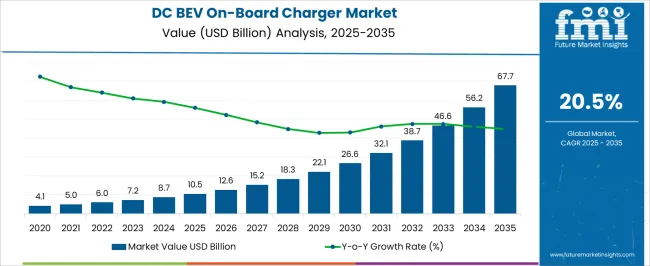
| Metric | Value |
|---|---|
| DC BEV On-Board Charger Market Estimated Value in (2025 E) | USD 10.5 billion |
| DC BEV On-Board Charger Market Forecast Value in (2035 F) | USD 67.7 billion |
| Forecast CAGR (2025 to 2035) | 20.5% |
The DC BEV on-board charger market is expanding rapidly as electric vehicle adoption accelerates globally. Advances in battery technology and increasing consumer demand for faster charging solutions have driven the need for higher capacity on-board chargers.
Regulatory incentives and environmental policies encouraging electric mobility are further fueling market growth. Improved infrastructure and integration of fast charging technologies in vehicles have enhanced user convenience and reduced charging times, making BEVs more attractive to a wider audience.
Automakers are focusing on incorporating efficient and compact on-board chargers that support higher power ratings to meet performance expectations. Looking forward, innovations in charger design, energy management, and vehicle-to-grid capabilities are expected to shape market dynamics. The market growth is primarily led by on-board chargers rated between greater than 11 kW and 22 kW, which offer a balanced solution for residential and commercial charging needs.
The DC BEV on-board charger market is segmented by rating and region.
By Rating: The market is divided into >11 kW to 22 kW and >22 kW. The >11 kW to 22 kW segment is projected to dominate with a 61.8% share in 2025. This rating range strikes a balance between faster charging speeds and cost efficiency, making it suitable for both passenger and commercial BEVs. It also supports a wide range of battery capacities and voltages, which enhances its adaptability across different EV models.
By Region: Regionally, the market is segmented into North America, Latin America, Western Europe, Eastern Europe, Balkan & Baltic Countries, Russia & Belarus, Central Asia, East Asia, South Asia & Pacific, and the Middle East & Africa. China and India are leading in terms of growth rates due to rapid EV adoption and supportive government incentives, while Europe (notably Germany and the UK) continues to expand under strict carbon-reduction regulations. The United States shows steady growth driven by EV adoption and infrastructure development, though at a slower pace compared to emerging markets.
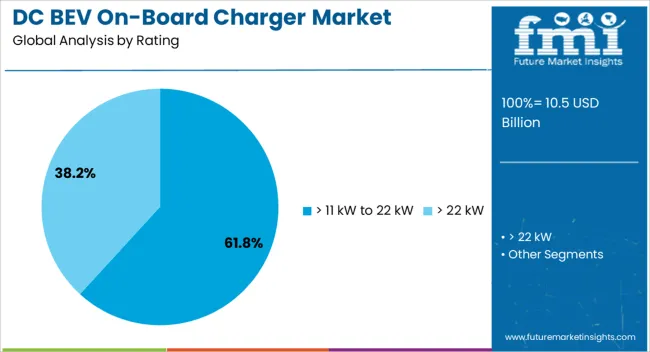
The segment of on-board chargers with a rating greater than 11 kW up to 22 kW is projected to hold 61.8% of the DC BEV on-board charger market revenue in 2025. This segment's popularity has been driven by its ability to provide faster charging speeds while maintaining compatibility with existing vehicle architectures and charging infrastructure.
Chargers in this range deliver significant reductions in charging time compared to lower-rated units, improving the overall user experience. Manufacturers have focused on this rating to balance cost efficiency and performance, appealing to both passenger and commercial electric vehicles.
Additionally, the segment supports a wide range of battery sizes and voltages, increasing its versatility across different BEV models. As demand for quicker turnaround times grows among consumers and fleet operators, the > 11 kW to 22 kW segment is expected to sustain its dominant position.
The DC BEV on-board charger market is experiencing growth due to the increasing adoption of electric vehicles (EVs) worldwide. On-board chargers (OBCs) are critical components in electric vehicles, enabling the conversion of AC power from charging stations into DC power for battery storage. The rising demand for electric vehicles, along with advancements in charging technology, is driving the market for high-performance, efficient DC on-board chargers. However, challenges such as high manufacturing costs and the need for more widespread charging infrastructure remain. Despite these challenges, technological advancements and government support for green energy initiatives provide opportunities for market expansion.
The primary driver for the DC BEV on-board charger market is the rapid adoption of electric vehicles globally. As the push for cleaner and more energy-efficient transportation increases, consumers and governments are gravitating toward electric vehicles (EVs), which require robust on-board charging solutions. DC on-board chargers are crucial in enabling fast and efficient charging of electric vehicles, which is essential for reducing charging time and increasing vehicle convenience. With the development of high-performance chargers that support ultra-fast charging, the demand for DC OBCs is accelerating. The expansion of charging infrastructure, supported by government incentives and policies, is further driving the need for DC OBCs, making them a critical component for enabling the large-scale adoption of electric vehicles.
A significant challenge in the DC BEV on-board charger market is the high production cost of these chargers. Advanced charging systems, particularly those capable of supporting high-speed or ultra-fast charging, require sophisticated technology, high-quality components, and significant research and development investments. This can make DC OBCs expensive, which may discourage some consumers or automakers from adopting them, especially in emerging markets with price sensitivity. The lack of standardization in charging protocols and connectors among different vehicle manufacturers and regions complicates the widespread adoption of DC OBCs. The absence of uniform standards can lead to compatibility issues, increasing costs for consumers and creating inefficiencies in the development of charging infrastructure.
The DC BEV on-board charger market presents significant opportunities driven by advancements in charging technology and the integration of smart charging systems. Innovations in charging speed, efficiency, and battery management are opening new possibilities for faster and more reliable charging solutions. The rise of smart charging, which integrates with IoT and vehicle-to-grid (V2G) technology, is another opportunity. By enabling vehicles to communicate with the grid, smart charging systems can optimize charging times, reduce costs, and contribute to grid stability. The increasing deployment of ultra-fast charging stations and integration with renewable energy sources also presents opportunities for manufacturers to develop more advanced DC OBCs that meet the growing demands of consumers and infrastructure developers. The global push toward carbon neutrality and the need for zero-emission transportation further promote the development and adoption of DC on-board chargers.
A key trend in the DC BEV on-board charger market is the integration of advanced battery technologies with on-board chargers. The rise of solid-state batteries, which offer higher energy density and faster charging times, is influencing the design and development of DC OBCs. Manufacturers are focusing on developing chargers that can support the unique requirements of these advanced batteries, ensuring compatibility and maximizing charging efficiency. Wireless charging technology is gaining traction in the market. Wireless charging systems, which eliminate the need for physical connectors and enable easier integration into home and commercial charging stations, are emerging as an innovative trend in the DC OBC space. As these technologies continue to evolve, the demand for more efficient, user-friendly, and adaptable charging systems will continue to shape the future of the DC BEV on-board charger market.
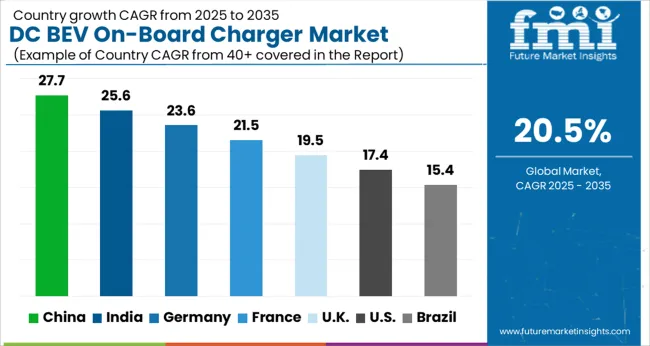
The DC BEV On-Board Charger Market is projected to grow at a CAGR of 20.5% globally from 2025 to 2035. China leads the market with a growth rate of 27.7%, followed by India at 25.6% and Germany at 23.6%. The United Kingdom is expected to grow at 19.5%, while the United States shows a growth rate of 17.4%. The rapid growth of electric vehicles, along with the increasing adoption of DC fast-charging infrastructure, is driving the demand for on-board chargers, particularly in emerging markets. Developed economies are also witnessing growth due to government incentives, infrastructure development, and the push for cleaner and more efficient transportation solutions. The analysis covers 40+ countries, with the leading markets shown below.
Demand for DC BEV On-Board Chargers in China is growing at a 27.7% CAGR through 2035. As one of the largest EV markets globally, China is accelerating its transition to electric mobility, contributing to the growing demand for fast charging solutions. The country’s robust EV infrastructure, including extensive charging networks and governmental incentives, is driving the adoption of DC on-board chargers. The Chinese government’s policies to reduce carbon emissions and promote electric vehicle usage are accelerating the market for DC BEV on-board chargers in China. Additionally, China’s booming automotive industry, with key EV manufacturers, further supports market growth
Sale of DC BEV On-Board Chargers in India is projected to grow at a 25.6% CAGR through 2035. India’s growing focus on electric mobility, along with increasing consumer demand for affordable electric vehicles, is driving the need for efficient and fast charging solutions. The Indian government’s push for EV adoption, supported by incentives and policies aimed at reducing pollution, is fueling the demand for DC chargers. Additionally, the rise in EV manufacturing and infrastructure development in the country further accelerates the adoption of DC on-board chargers. India’s rapid urbanization and industrialization also contribute to the market expansion.
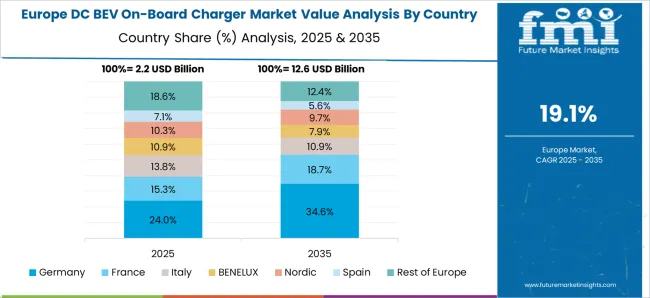
Demand for DC BEV On-Board Chargers in Germany is growing at a 23.6% CAGR through 2035. Germany, known for its automotive excellence, is rapidly adopting electric mobility solutions in line with the European Union’s sustainability goals. The country’s push for reducing CO2 emissions and advancing green technology has spurred the development of DC charging infrastructure. German automakers are heavily investing in EV manufacturing, contributing to the increasing need for DC on-board chargers. With a robust EV market and strong regulatory support for clean energy initiatives, Germany is a key player in the growth of the DC BEV on-board charger market.
The DC BEV On-Board Chargers Market in the United Kingdom is projected to grow at a 19.5% CAGR through 2035. The UK has been a key player in Europe’s transition to electric mobility, with growing adoption of EVs and a focus on reducing carbon emissions. The UK government’s commitment to achieving net-zero emissions by 2050 and investments in EV infrastructure drive the market for DC BEV on-board chargers. The growing popularity of electric vehicles in the UK, combined with the increasing demand for fast charging solutions, contributes to the continued growth of the market
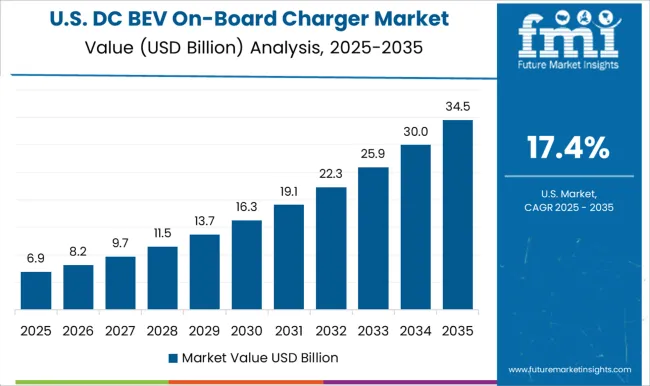
Demand for DC BEV On-Board Chargers in the USA is projected to grow at a 17.4% CAGR through 2035. The USA is experiencing steady growth in electric vehicle adoption, driven by consumer demand for sustainable transportation and government incentives. The increasing focus on infrastructure development and the shift toward renewable energy are driving the demand for DC charging solutions. The USA market is supported by the automotive industry’s push for electric vehicles, along with the government’s policies to reduce emissions and support clean energy technologies. Despite slower growth compared to emerging markets, the USA continues to be a major player in the global EV charging market
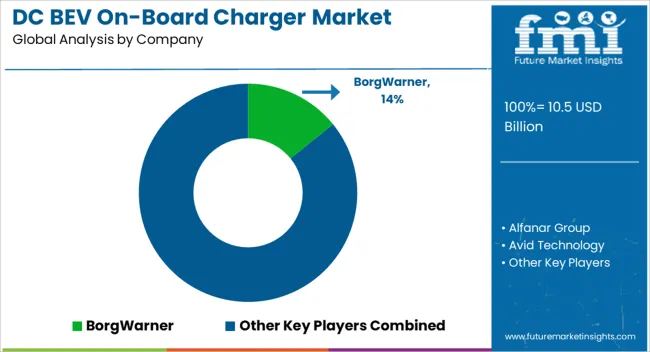
The DC BEV (Battery Electric Vehicle) on-board charger market is driven by leading players specializing in electric vehicle (EV) charging technologies, offering innovative solutions designed to support the growing adoption of battery electric vehicles worldwide. BorgWarner is a key market leader, offering advanced DC on-board chargers with a focus on improving efficiency, charging speed, and compact designs, catering to the increasing demand for EV charging infrastructure.
Alfanar Group provides high-performance on-board chargers for electric vehicles, emphasizing reliability and energy efficiency in charging systems. Avid Technology offers DC on-board chargers designed for integration in electric commercial vehicles, focusing on high-power charging and optimized energy consumption. Bell Power Solution and Brusa Elektronik specialize in providing efficient DC on-board chargers for passenger EVs, with a strong emphasis on modular design, compactness, and high efficiency for fast charging.
Kirloskar Electric Company and Powell Industries offer cost-effective and durable charging solutions, designed for various applications in the EV industry, with an emphasis on enhancing energy conversion and battery life. Stercom Power Solutions, STMicroelectronics, Toyota Industries Corporation, and Valeo provide innovative and reliable charging solutions for BEVs, focusing on improving the overall performance and energy efficiency of EV systems. Xepics Italia offers customizable DC on-board chargers for electric vehicles, focusing on tailored solutions for both small and large-scale electric vehicle manufacturers.
| Item | Value |
|---|---|
| Quantitative Units | USD 10.5 Billion |
| Rating | > 11 kW to 22 kW and > 22 kW |
| Regions Covered | North America, Europe, Asia-Pacific, Latin America, Middle East & Africa |
| Country Covered | United States, Canada, Germany, France, United Kingdom, China, Japan, India, Brazil, South Africa |
| Key Companies Profiled | BorgWarner, Alfanar Group, Avid Technology, Bell Power Solution, Brusa Elektronik, Current Ways, Delphi Technologies, Delta Energy Systems, Eaton Corporation, Ficosa International, Innolectric, Kirloskar Electric Company, Powell Industries, Stercom Power Solutions, STMicroelectronics, Toyota Industries Corporation, Valeo, and Xepics Italia |
| Additional Attributes | Dollar sales by product type (standard chargers, fast chargers, ultra-fast chargers) and end-use segments (passenger EVs, commercial EVs, two-wheelers, heavy-duty vehicles). Demand dynamics are influenced by the rapid adoption of electric vehicles, government incentives for EV infrastructure development, and the need for efficient charging solutions that reduce charging time. Regional trends show strong growth in Europe and North America, driven by EV adoption policies and investment in green transportation, while Asia-Pacific is expanding due to the rapid growth of electric vehicle manufacturing and charging infrastructure. |
The global DC BEV on-board charger market is estimated to be valued at USD 10.5 billion in 2025.
The market size for the DC BEV on-board charger market is projected to reach USD 67.7 billion by 2035.
The DC BEV on-board charger market is expected to grow at a 20.5% CAGR between 2025 and 2035.
The key product types in DC BEV on-board charger market are > 11 kw to 22 kw and > 22 kw.
In terms of , segment to command 0.0% share in the DC BEV on-board charger market in 2025.






Full Research Suite comprises of:
Market outlook & trends analysis
Interviews & case studies
Strategic recommendations
Vendor profiles & capabilities analysis
5-year forecasts
8 regions and 60+ country-level data splits
Market segment data splits
12 months of continuous data updates
DELIVERED AS:
PDF EXCEL ONLINE
DC Traction Switchgear Market Size and Share Forecast Outlook 2025 to 2035
DC Electromagnetic Brakes Market Size and Share Forecast Outlook 2025 to 2035
DC and PKI Market Size and Share Forecast Outlook 2025 to 2035
DCIM Market Size and Share Forecast Outlook 2025 to 2035
DC Contactor Market Size and Share Forecast Outlook 2025 to 2035
DC Solar Cable Market Size and Share Forecast Outlook 2025 to 2035
DC Servo Motors and Drives Market Size and Share Forecast Outlook 2025 to 2035
DC Grid Connected Microgrid Market Size and Share Forecast Outlook 2025 to 2035
DC Motor Control Devices Market Size and Share Forecast Outlook 2025 to 2035
DC Powered Servers Market Size and Share Forecast Outlook 2025 to 2035
DC Switchgear Market - Size, Share, and Forecast 2025 to 2035
DC Power Supplies Market - Size, Share, and Forecast 2025 to 2035
DC Power Systems Market Trends - Growth, Demand & Forecast 2025 to 2035
DC Power Supply Module Market – Powering IoT & Electronics
DC Drive Market Size, Share, Trends & Forecast 2024-2034
DC-DC Converter Market Insights – Size, Demand & Forecast 2023-2033
ADC & DAC In Quantum Computing Market Size and Share Forecast Outlook 2025 to 2035
PDC Drill Bits Market Size and Share Forecast Outlook 2025 to 2035
HVDC Transmission System Market Size and Share Forecast Outlook 2025 to 2035
HVDC Converter Market Size and Share Forecast Outlook 2025 to 2035

Thank you!
You will receive an email from our Business Development Manager. Please be sure to check your SPAM/JUNK folder too.
Chat With
MaRIA